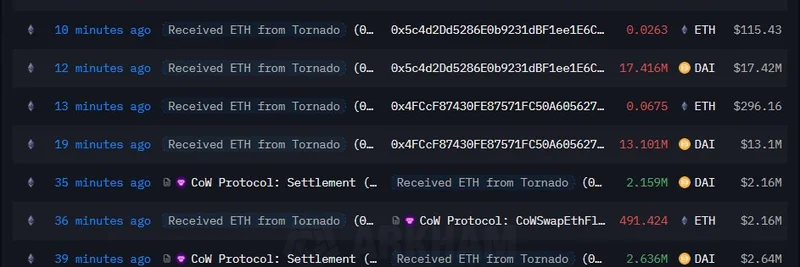Hey everyone, if you're into the wild world of blockchain and meme tokens, you know that hacks and exploits are unfortunately part of the game. Today, we're breaking down a fascinating tweet from OnchainLens that sheds light on some sneaky on-chain moves by a notorious hacker. Let's unpack this step by step, keeping things simple and straightforward.
The Tweet That Caught Our Eye
OnchainLens, a sharp on-chain analytics account, posted this thread revealing that three wallets have offloaded a whopping 8,961 ETH—valued at about $39.26 million—for DAI, a popular stablecoin pegged to the US dollar. The kicker? All these funds trace back to Tornado Cash withdrawals, and according to Arkham Intelligence, they belong to a hacker. Check out the Arkham entity explorer for the full deets.
Who Is This Hacker?
This isn't just any random wallet activity—it's linked to the Orbit Chain exploit from early 2024. For those new to this, Orbit Chain is a cross-chain bridge protocol that allows assets to move between different blockchains seamlessly. Unfortunately, in January 2024, hackers made off with around $81.5 million in various assets, including ETH, stablecoins, and wrapped BTC.
The exploiter went dormant for months but kicked back into gear in June 2024, starting to launder funds through Tornado Cash. To date, they've moved over 17,000 ETH (worth more than $66 million) through the mixer. The latest batches include transfers like 4,320 ETH just a couple of days ago. And now, we're seeing these funds pop out the other side and get swapped for DAI.
How Does the Laundering Work?
Let's break it down without the jargon overload:
Step 1: Deposit into Tornado Cash
Tornado Cash is a privacy tool on Ethereum that lets users "mix" their coins with others, making it harder to trace the origins. Think of it like throwing your dirty laundry into a big communal washer—everything comes out clean and anonymous. The hacker deposits stolen ETH into Tornado pools.Step 2: Withdraw to Fresh Wallets
After mixing, the funds are withdrawn to new, clean addresses. In this case, three wallets received the 8,961 ETH from Tornado Cash in small increments to avoid raising red flags—things like 0.038 ETH here, 99.5 ETH there.Step 3: Swap to DAI via CoW Swap
Once in the new wallets, the ETH is quickly traded for DAI using CoW Protocol (also known as CoW Swap). This is a decentralized exchange aggregator that finds the best prices across multiple DEXs while protecting against MEV (miner extractable value) attacks. The swaps happened at an average price of $4,381 per ETH, netting $39.26 million in DAI. Why DAI? It's stable, so no price swings, and easier to cash out or move around.
From the screenshots, you can see the pattern: ETH comes in from Tornado, then immediately gets swapped via CoW Protocol settlements.
Why This Matters for Meme Token Enthusiasts
While Orbit Chain isn't directly a meme token project, cross-chain bridges like it are crucial for many meme ecosystems. Tokens on Solana, Base, or other chains often rely on bridges to move liquidity, and exploits like this highlight the risks involved. If you're building or investing in meme tokens, this is a reminder to prioritize security audits and decentralized alternatives.
Plus, with meme tokens often launching on Ethereum or Layer 2s, understanding tools like Tornado Cash and CoW Swap can help you spot unusual activity in your favorite projects' treasuries or whale wallets.
Latest Updates on the Hacker's Holdings
According to recent reports, the Orbit Chain hacker still holds about 9,511 ETH (around $41.6 million) and 20 million DAI. They've been buying ETH low (around $2,300) and watching it appreciate—smart, if not for the whole "stolen funds" part. On-chain analysts like Yu Jin and Lookonchain are keeping a close eye, so expect more updates.
If you're curious about more on-chain mysteries or how to protect your own assets, stick around Meme Insider for the latest scoops. What do you think—is this hacker getting bolder, or just cashing out? Drop your thoughts in the comments!
For more on blockchain security, check out our guides on common crypto exploits and how to use privacy tools safely.



